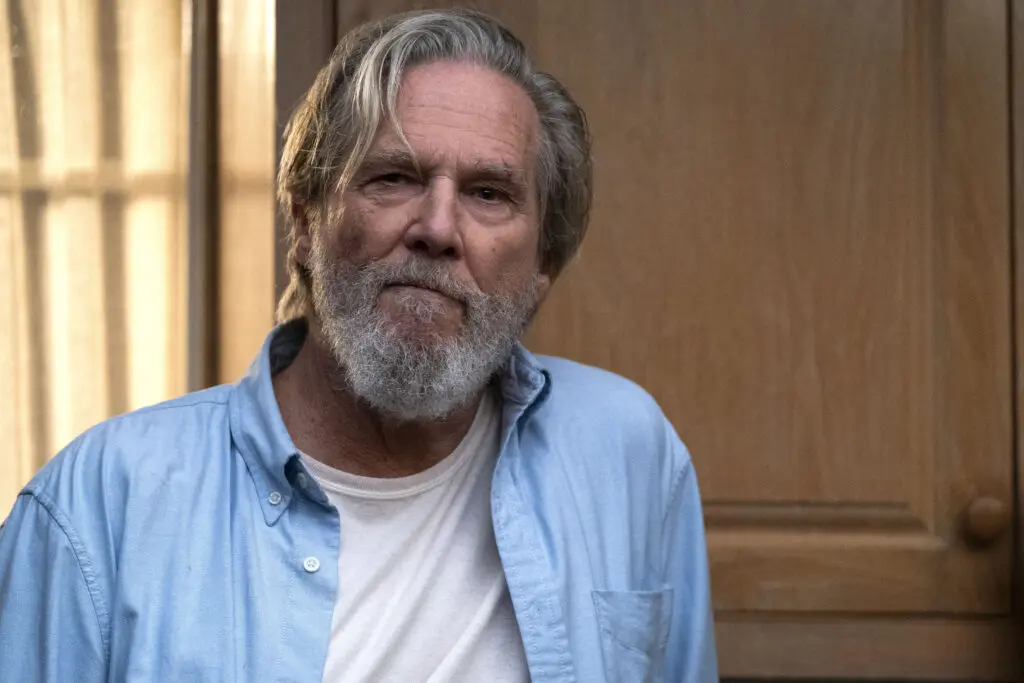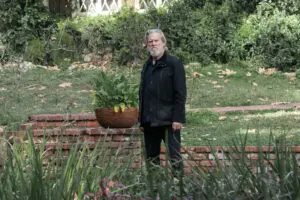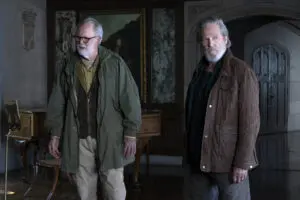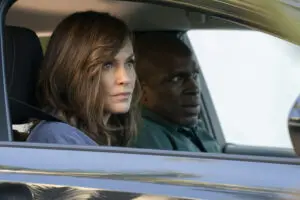Summary
“XII” feels like a return to the style and vibe of Season 1. It excels in its restraint, depicting a couple of key events off-screen in novel ways.
Is Angela/Emily/Parwana dead? That’s certainly the question we’re left with by the end of The Old Man Season 2, Episode 5, though anyone who has seen a thriller before can take a pretty good guess. Still, “XII” does a very good job of depicting the character’s potential demise off-screen, giving it power through the reactions of Chase and Harper and leaving the precise circumstances ambiguous.
This is unusual for a show that generally favors a more high-octane approach, but is fitting for an episode with no action. There’s a torture sequence that also occurs off-screen, letting the implications take root in the audience’s mind instead. It’s that old thing of the monster in horror movies always being less scary once it’s revealed; what you can conjure in your mind is always worse than the reality.
Hamzad’s Funeral and Parwana’s Decision
“XII” begins with the same dilemma we arrived at in Episode 4 when Faraz Hamzad died from his wounds and Russian assassins killed Morgan Bote. The combination of these two events leaves Hamzad’s village in Afghanistan, where Parwana still resides, vulnerable to the Taliban, creating a ticking-clock urgency for Chase, Harper, and now Zoe, who’re Stateside trying to freestyle potential solutions.
Despite this being the overarching threat, though, the opening languishes over Hamzad’s funeral, which is only glimpsed in brief shots but excuses a lengthy monologue from Parwana that is her working through any residual issues about never having met her father until now and not having ever really known her mother.
Parwana burns the letter after reading it aloud, symbolizing that it was largely for her benefit rather than a eulogy in the strictest sense. But it lends us more context for her decision to remain behind in the village, even while Tarik and Farouk leave on a chopper for the (relative) safety of the U.S.
Parwana has made her decision, and that letter rationalizes it. And right in time, too, since the Taliban are knocking on the door.
Parwana’s Goodbye
Since the audience knows Parwana’s predicament, the U.S.-based scenes, which find Harper breaking a long-time promise to his wife, Cheryl, to not bring work home with him, are lent a significant sense of urgency and dread.
With Cheryl’s bombshell that Henry no longer lives at the house and thus can’t be spirited away to safety, and Chase’s speculation that the Pavlovich connection must be more complex than appearances suggest for him to risk murdering Bote on U.S. soil, there’s a frantic energy about things. I found that the whole thing is also oddly sad. Harper hasn’t just brought “work” home, but a lifetime of secrets that he has to reveal to Cheryl, who always thought she understood the nature of his job but never quite reckoned with the idea that “Angela” was a fabrication, her entire existence and history a carefully cultivated persona.
By the time the power goes out, it just feels like adding insult to injury.
Eventually, Chase is able to get through to Parwana, which only makes matters worse. Chase tries to warn her that Bote is dead and Pavlovich is involved, but Parwana has bigger problems. She tells her dads that the Taliban have already arrived and that they’re breaching the village through the tunnels that Chase and Harper imagined as her only possible escape route. There are only women and children left behind in the village; a fight is unwinnable. Parwana takes the moment to say goodbye to Chase and Harper, telling Chase privately that her decision to remain behind in Afghanistan shouldn’t be taken as a rejection of him and the life he provided for her. With screams and gunfire, the line goes dead.
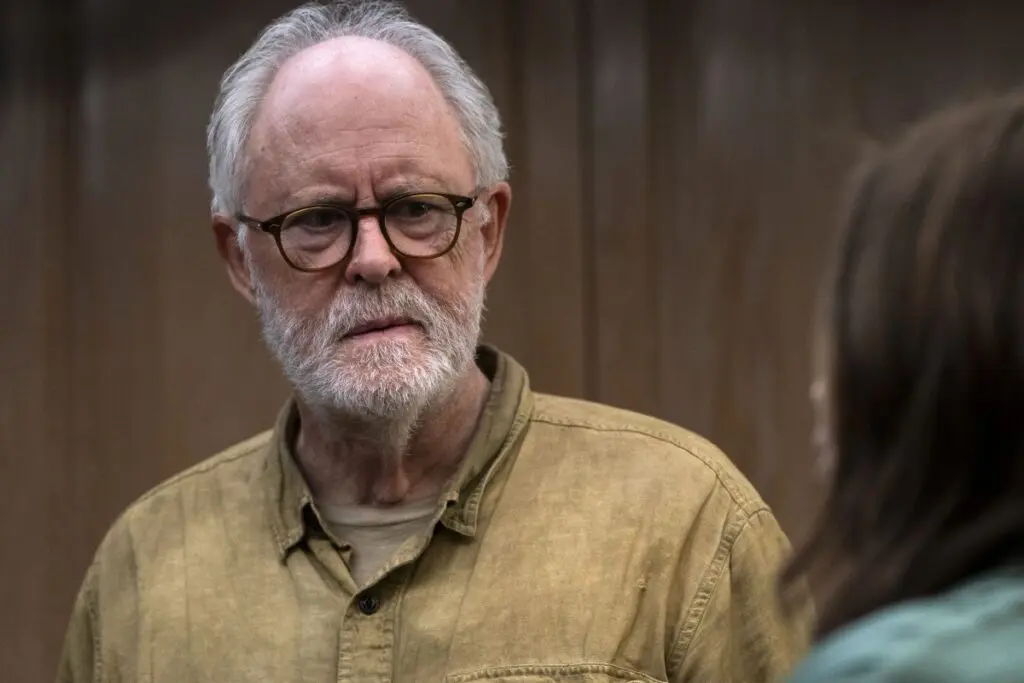
John Lithgow as Harold Harper in The Old Man | Image via FX
The Grieving Process
This development really lets Jeff Bridges off the leash, acting-wise, and I’m reminded again how much better this show is thanks to casting real actors in the lead roles. That sounds like an obvious point, but in what is primarily an action-thriller it isn’t.
There’s a clue on the phone that gives a small hint of Parwana’s survival – the men who attacked her were speaking Russian, not Pashto or Dari. While the assumption is that the Taliban would have probably killed her outright, Pavlovich likely has other things in mind, so I think we can take this as a ray of hope. Chase seems to feel the same since he decides the best course of action is to remove Pavlovich’s surviving hitman from the trunk of the car and torture him in the basement.
While this happens, John Lithgow delivers a much more understated depiction of his grief, working through a conversation with a hallucination of his late son, Chip. If it wasn’t for Parwana’s farewell, this would be the strongest scene in The Old Man Season 2, Episode 5; it’s moody and atmospheric but intensely personal, and once again uses the power of implication – we know what Chase is doing in the basement while this is going on – to give the scene an additional contour.
The conversation, imagined or otherwise, gives Harper a brainwave, and he presses Zoe for a description of Bote’s final moments. Since he died with his phone in his hands, Harper thinks he might have been passing on essential information to someone as yet unknown. At the same time, Chase emerges from the basement having learned that the assassin had two additional targets beyond Bote – Marcia and Henry Dixon. In other words, Chase and Zoe.
A New Lead
The only person who might have a clue what Bote shared is Hamzad’s lawyer, who wants to talk to Zoe in person. This and Zoe being a target justify her place in this second season despite her inclusion initially feeling a bit forced. That means tracking down Hamzad’s lawyer in London while Harper remains behind to presumably clean up the tortured corpse in his basement.
The simplest way of describing “XII” is, I think, as a return to the style of Season 1. “Return to form” wouldn’t quite be accurate, since Season 2 has been very good on its own terms, but it has been notably different. Chase, Zoe, and the dogs being reunited feels like it’s harkening back to the slower-paced but more dramatic style of those early episodes. And that’s fine by me.
RELATED:

